Suicidal Thoughts Every Day for 33 Years to Relief | Charlene’s Success Story
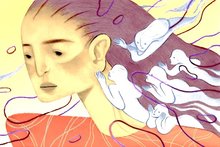
Tired of being numb.
Tired of being depressed while still on medications.
Charlene emailed me telling me she was coming off of her meds.
She started a few basic supplements and cut out dairy, gluten and sugar.
L-tyrosine didn’t work, so she tried l-tryptophan.
Then she cut out all her meds completely and starting taking vitamins, l-tryptophan, 5-htp, and ashwagandha.
12 days off the meds she started to have genuine laughter while watching movies after her mother told her she couldn’t remember the last time Charlene laughed.
Enter Charlene
I was 9 years-old when I began having suicidal thoughts and began believing negative things about myself. Having been bullied and assaulted at school, molested at home, and shy to the point of being what I believed was invisible to people, I had enough ammunition to build my arsenal of negative beliefs about myself.
33 years later as I look back on my journey with depression, a lot has happened. There wasn’t a single day, even the happy ones, when I didn’t think about ending my life. Not a single day. It had become such a part of me, it was my normal.
I first got counseling and medication when I entered college. I worked to pay for it all out of my own pocket. Family would not help. They didn’t believe in mental illness. To them I just had no faith in God.
Hearing Voices & Breaking Down in Public
You name the symptom, I experienced it. From hearing voices telling me to hurt myself to breaking down in tears in public. I’ve been through it all. I was taken to the emergency room a few times with depressive, suicidal episodes and admitted myself to the psych unit. There were times when I was so depressed I stopped speaking. It didn’t matter to me when people were speaking to me because I just wanted them to hear my pain and do something about it, but no one ever did.

Charlene Got So Bad She Heard Voices
So how did I get to the point where I was willing to give up on medication? I was taking my daughter to see a new prescribing doctor one day. She also has a mental illness and needed to get her medication.
When we entered the office we were told that the doctor would not see my daughter because we were late. I looked at the clock. We were 10 seconds late. I stood there absolutely incredulous. This person with no conscience whatsoever refused to see a child who needed medication to keep her mood stable or she would hurt herself because we were 10 seconds late.
I’d been getting counseling and medication at this location for many years and believed that they would give her the same care. That day I was done. I knew I would never go back, not even to see my own counselor or doctor.
Later that same day, I don’t recall how, I found Dominate Depression and TJ Nelson. I believe it was meant to be because I not only refused to return to the facility, I felt deeply in my heart that life had to be better than what I was living.
Making The Decision To Quit Medications
The medication made me feel like a zombie. I was still suicidal and sad on my medication and I have tried just about every depression medication in varying combinations for 24 years. Enough was enough. I knew that my medication would run out eventually and it seemed that weaning off them and taking supplements made sense for me.

Many People Report Feeling Like a Zombie on Antidepressants
I tried various supplements mentioned on the site, but some made me feel loopy. Then I tried L-Tryptophan. Bingo! After a few days, I became a new person.
2 months after finding Dominate Depression I sent TJ an email telling him that for the first time in my life I felt human. The constant medicated feeling was gone. The brain fog, the memory loss, the depression, and hallelujah, some of the weight was gone.
Off Medications With A New Life Ahead
I’ve been completely off my medications for over 2 months. I’m so happy for my new start without depression. I have a new life, full of wonderful possibilities that don’t include the fear of breaking down and the lack of emotional control that kept me from doing so many things. I have no doubt that I’m done living under that cloud.
There are times when I almost want to grieve for the 33 years of pain I endured, but that would take me right back into depression. From now there’s only joy. Life isn’t perfect all the time, but I can face the ups and downs as a much stronger woman.
I am so thankful for TJ. His bravery in sharing his experience with depression has made such a difference in my life. I can only do the same for someone else. When you feel this good, you want to pass it on.
Four Failed Withdrawal Attempts to Depression Free | Helen’s Success Story
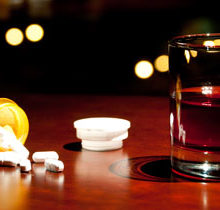
Helen emailed me letting me know that she was was off citalopram and had emotional stability.
Since having a baby 12 years ago, she struggled with depression, SSRI dependency, and had a midlife crisis.
Now she is able to cope without using sugar or alcohol.
Naturally, I wanted to share her story.
Enter Helen
I was a classic Alpha-type personality – from business school to a career in Finance (to please my Dad!), teaching aerobics, captaining a sports team in my ‘spare’ time, and maintaining a long distance relationship. I worked just as hard at my social life and would not be happy unless I had plans fixed up for weeks in advance.
After 10 years of this, I suffered bereavements of 2 friends in close succession, and I hit a depression which I labeled my early mid-life crisis.
The work, hobbies and socializing was not giving me a rush any more. I couldn’t get out of bed and needed a solution. So after reading lots of motivational books, my solution was to plan harder, work harder and leave even less time to think!
Most people around me were gently hinting that I may need some help from therapy and/or anti-depressants but this was the UK, 20 years ago and nobody talked about their feelings!! So I carried on and spent more time drinking alcohol to drown out the feelings of negativity. Friends around me were getting married and having children and I had decided that was not going to be me as I was a career woman and didn’t need that baggage.
Taking SSRIs and Refusing Therapy
I started to take SSRIs after another ‘mid life crisis”, and refused therapy as the solution was surely just to work harder and then I would be happy when I had achieved all of my goals! One concession I did make to my inner voice was to reconsider my career – I had really wanted to be in healthcare but thought that would disappoint my parents who expected me to be in business.
I had a new project – retraining for a new healthcare career and that managed to become my focus for the next 5 years. I stopped focusing on my depression. I was just way too busy to examine my innermost feelings and that was fine with me. Still on SSRIs, but again using alcohol and socializing to bridge the gap I was feeling. I was lucky enough to meet a new boyfriend who became my husband during that time and that also kept me busy.
After I graduated with a medical degree, I could not wait to get started in my new career – I had so many plans!! But within a few months my husband got posted abroad for his job and I had to follow him. So, suddenly in a new country, we had to get married for a visa, and I became pregnant very quickly.
I could not work for legal reasons and with no friends, family, or work, I had to bring up a new baby by myself. My baby represented everything I could not control and I quickly fell into severe post-natal depression, although it was undiagnosed because I hid it from my OB-GYN.
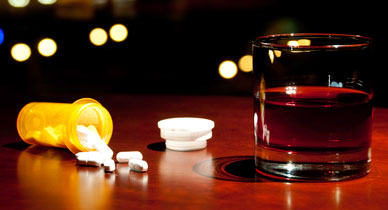
Antidepressants and Alcohol Can Be A Tricky Combination
Thoughts of Self-Harm and Denial
There were many days with thoughts of self harm and harming the baby and I was in despair. I had stopped taking SSRIs as I worried about their effect on my pregnancy. Plus now that I was a healthcare practitioner I could not admit to having depression myself!
I struggled on for a few years with my baby who, despite everything, was lovely. However my partner and I were not in a good place and divorce was a very real prospect. We were saved by having an opportunity to move back to the UK and with more friends and family around the daily trials of looking after a small child were eased and I could start working again.
I was so excited to find a part-time healthcare consultant job near to my home and arranged daycare for my child and quickly got stuck into my new role. However things were not as they seemed – my boss was unstable and demanding and I found that I was working full time hours on part time pay, plus having to do all of the child care when at home as my husband was on late shifts. The expectations I placed on myself finally tipped me over the edge.
Isolation and Going Back On SSRIs
I was hiding in my bedroom from everyone when I was not at work, and crying all of the time with no provocation. I stopped all socializing and was desperately fantasizing about leaving my family to move to a deserted island in the middle of the ocean with no other humans around.
A friend actually convinced me to book a doctors appointment and after a questionnaire, I was again diagnosed with depression and given SSRIs again – therapy was an 8 week wait. So I read self help books instead. This helped in the short term and after a year I wanted to come off the SSRIs and get back to ‘normal’, except it wasn’t that easy. When I was younger there were no withdrawal symptoms but it was 10 years later and my brain could not bounce back.
Horrid hot flashes, leg cramps, insomnia, the famous brain zaps, crying jags, fainting and dizziness were happening constantly and I could not cope. So I went back on the SSRIs, and then off them again – with the same results, and so I tried a total of 4 withdrawals over the past 10 years all with the awful withdrawal symptoms. My doctor suggested various patterns of decreasing the dosage but it did not help.
I was resigned to having to be on SSRIs for the rest of my life because of these awful withdrawal symptoms – until I found Dominate Depression. Suddenly there was a new way of looking at how depression occurs and an alternative way to treat it. I was so impressed with the explanations about bio-chemistry in lay terms, and the fact that the suggestions were tried and tested by an actual person on themselves. I felt confident that as someone was willing to do this and put their name on it that it must be effective.
Weaning Off Antidepressants with Amino Acids
I started the amino acid therapy and reduced my SSRIs – which did have a noticeable impact within a few days. Side effects were reduced by about 90%, and I could follow the whole tapering program with the SSRIs without fear!
Since then – 3 months ago – I have happily ordered a lightbox, and continue to use the amino acid regime, and other supplements such as magnesium. I have started seeing a Cognitive Hypnotherapist who helps reset the negative thoughts.
Like other people who have discussed their stories, I know that the Dominate Depression approach is not a silver bullet – you have to work to get the best results – but it is the best approach to depression that I have used in my 25 year history and it is the only approach that I recommend to my patients and friends.
Since being on the program I have started my own business and I know that I could not have done this without the support of the website. I am very grateful to TJ and happy to recommend Dominate Depression to any fellow sufferers.
Thank you – Helen
Beating Depression and Weight Gain from Antidepressants | Sheree’s Success Story
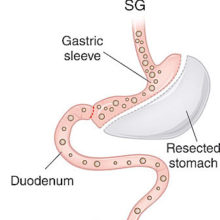
One thing you’re never really told about is how severe the side effects can be when taking antidepressants.
Antidepressant medications aren’t these risk-free pills that anyone can take without worry.
Sheree had been battling with depression and hopelessness. After taking antidepressants, she now had to worry about weight gain after it caused her to put on 30 kilos (66 pounds).
Here is her success story of being on antidepressants for 8 years, gaining weight, and beating both those problems.
Enter Sheree
Ok, where to start. Well my names Sheree and 8 years ago I was diagnosed with post natal depression after the birth of my third child. If I take myself back to those days it was a dark time for me and my family. I remember the frustration of not understanding why I felt so sad and tired.
The confusion of feeling guilty and feeling like I was a failure because I shouldn’t have been sad. I had no right so to speak to be sad. I had a wonderful life, a wonderful husband and 3 amazing children. We had food on the table and wanted for nothing. But the fact was I was dying on the inside.
After many years of the depression roller coaster and many different medications I was still no closer to being happy and fulfilled with life and starting to give up any hope of beating this thing called depression. I worried that this internal battle was going to be for life. That thought alone was depressing because I was constantly tired and grumpy and bad tempered with my girls. I just wanted to isolate myself from the world.
Antidepressants Presented Another Battle: Weight Gain
I also put on 30 kilos over the 8 years while on the antidepressants which caused me to then loose self confidence. Now I had two wars going on inside of me. Depression and weight gain. So I tried to loose weight again and again with no real permanent change.
In April 2012 I had a gastric sleeve operation in a desperate bid to loose weight. After the surgery I lost 30 kgs and felt amazing for 2 years. I even completed my nursing diploma. But in those 2 years I had malnutrition because I wasn’t eating enough good food and protein and I’d also lost a lot of hair and started getting inflammation problems in my joints.
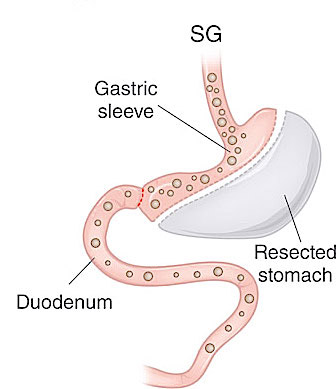
Gastric Sleeve Operation Caused Malnutrition
After 2 years my body crashed which made me tired and angry again. Then the weight started coming back even though I could only eat 200 grams at a time. I found a way to eat lots of small 200 gram meals. By June 2015 I’d put back on 20 kgs and so the cycle begins again.
Then I found TJ Nelson and his website Dominate Depression. This website has changed my life. With the information I found here I was able to make a change to my medication without it costing me hundreds of dollars. It’s a rare thing nowadays to find someone willing to help others. I can’t put into words the amount of relief and joy its brought to my family and lifestyle since finding dominate depression.
Weight Loss, Energy, and Moving Forwards
After taking advise on which natural medication to take, I started with 5HTP and followed TJ’s advice on getting off the antidepressants. I have now lost 15 kilos without even trying and now no longer need to have a afternoon nap from feeling tired all the time. My self confidence is up and I’m wanting to go out on family outings again.
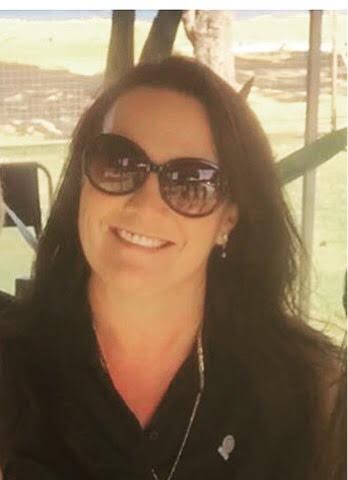 I’m socialising again and I’ve even started nursing again. I even want to eat healthy now. I no longer have cravings for chocolate or feel hungry all the time. I’ve also joined a company called Inner Origin which is an online shopping platform so I eat right and help others eat right too.
I’m socialising again and I’ve even started nursing again. I even want to eat healthy now. I no longer have cravings for chocolate or feel hungry all the time. I’ve also joined a company called Inner Origin which is an online shopping platform so I eat right and help others eat right too.
The skies the limit for me now. I follow a quote I saw one day that said, “Don’t try to be perfect, just try to be better than you were yesterday.”
Thank you for reading and I hope I can inspire or help others going through the same battles I did.
-Sheree
Being Treated Like a Science Experiment to Being Antidepressant Free | Nancy’s Success Story
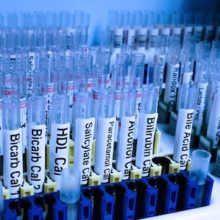
One of the frustrating experiences with depression is when doctors put you on a bunch of different medications.
It almost feels like you are a science experiment.
It’s hard to deal with all the changes, side effects, and feelings when they don’t work or make things more complicated.
Nancy emailed me sharing her story of how she was on many different medications and now she has successfully weaned off of them. She feels appropriate emotions and is doing much better.
Enter Nancy’s Success Story
Depression runs in my family on my mother’s side, although my gram, my mother, and my aunts never called it that. They tied it to being Irish, and called it melancholy.
I noticed as a child that my mother napped a lot. My siblings and I took it as normal… and she was always up to make supper when our father came home. It wasn’t until I was in high school at a friend’s house that I noticed a profound difference in how her mother behaved. My mother was nothing like her. My mother was emotionally unavailable, or extremely irritable. It was a rare occasion when she was happy.
When I was 7, my family went through a fire (12/31/1965 in Malden, Massachusetts), which killed my 3-year old cousin. My family and I were saved by a neighbor. This event changed me, forever. I had experienced death in a way no 7 year old child should ever have to. My mother told me years later that I was a different child after that. No more happy go lucky, and that there was a sadness in my eyes that was always there. In fact, my whole family was altered.. my gram, my aunts, and my parents. Being Irish, we were stoic and of course, time moved forward.
When I was 10, I was molested by an uncle. I didn’t tell my parents until he died when I was 19. Hitting puberty was when my psyche went through monthly ‘hits’ of depression, anxiety and sadness. By the time I was in high school, my self-esteem was very low. I was struggling emotionally, but I got good grades in school, was in the pep club, and had a few close friends.
At 15, I got a job at a day camp; it was after school during the school year, and full time in the summer. We had a sleepover at a conservation area with the kids, and after they went to sleep, the adult counselors had a fire with us junior counselors. They were passing around a bottle of apricot brandy, and I had never had a sip of alcohol.
When the bottle came to me, I was scared but didn’t want to seem ‘uncool’ and I took a sip. Almost immediately, there was a warmth that permeated my entire being… and I remember thinking that the pain was GONE. I felt relaxed, and happy… I had found relief from the anxiety and sadness that hung around me like an anchor.
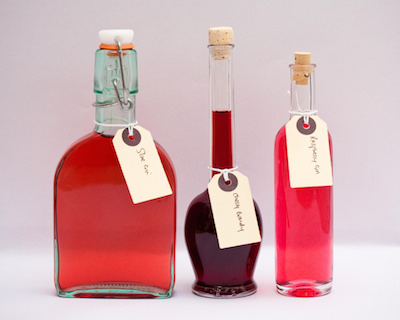
Many Times People Notice They’re Depressed When They Feel So Much Better After Drinking
Being Prescribed Her First Antidepressant
Forward ahead a few years, and I got married, I had 3 children, and was still struggling. I went to counseling and my first antidepressant was prescribed – Zoloft. I only took it for 2 days because I felt like I was crawling out of my skin and I couldn’t sleep. Then Wellbutrin – Nope. I was then put on Prozac and Xanax, which I took for several years. It lifted my depression but stopped working after several years. I wasn’t depressed, but I felt flatlined emotionally.
I then changed medical prescribers and after a consultation, he thought I was bipolar so prescribed Paxil and Lithium. I was on these medicines for a few years. I was feeling like a science experiment, and becoming very discouraged.. During this period, details are a bit fuzzy, but I was switched to a new medical prescriber and after a time, she took me off lithium. I was still prescribed Xanax all through this time, only taking .25 mg to help me sleep, as needed. I was also prescribed Ativan to take daily for anxiety. I was also prescribed Ambien but only took it twice, not liking it at all.
While on the Paxil and Ativan, I began to rethink this whole medicine thing. I stopped the Ativan cold turkey. It was awful. I had to take Xanax to ease the withdrawal symptoms of muscle twitching… but I did succeed after about 3 weeks.
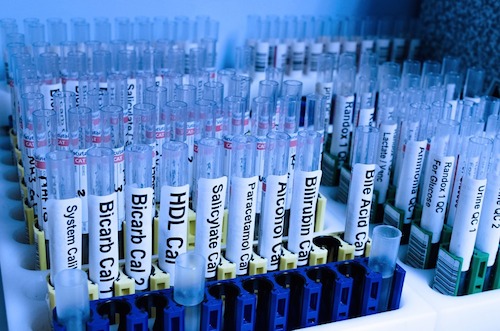
Being Prescribed Multiple Medications Can Feel Like You’re A Science Experiment
Deciding To Be Antidepressant Free At Age 58
Again, I was given another prescriber (!) and when I explained the Paxil didn’t seem to be working, was prescribed Celexa. At first 10 mgs, then 20, then 40. I took 40 mgs for about 8 years. When I turned 58, I wanted to be untethered from anti-depressants entirely.
I assumed that, since I no longer had monthly hormonal swings, I would have less anxiety. Also, I wanted my brain back: good, bad, and indifferent. I started researching and reading how best to accomplish this. I learned that for older adults, Celexa is not good and can even be dangerous. My mind was made up, and I was determined.
I started weaning off Celexa on December 6, 2016. I started taking 20 mgs (down from 40), and did this for 7 days. I halved the dose again to 10 mgs for 7 days, then 10 mgs every other day for 7 days, then 10 mgs every 3rd day for 4 days, then none. By January 1, 2017, I was off Celexa completely. I was anti-depressant free for the first time in 23 years.
Using Natural Methods and Dreaming Again
During this time, I had always taken a multivitamin, and I made sure I took a good one,. I also took 4 grams of a high quality omega-3 fish oil (which I was already taking for arthritis – works great for pain and stiffness), 500 mg of turmeric, 4000 units of D3 (2000 twice a day), sub-lingual B complex, and 100 mg of 5-htp twice per day. I also began taking 5 mg of melatonin at night which helped me sleep.
I also continued my almost daily walk at lunch (2-3 miles), and ate vegetables and good proteins. I had no brain zaps at all. I was concerned I would with such a fast wean but I did not. One of the first benefits of being off Celexa was DREAMING… it was years since I had remembered dreaming, and now I have vivid dreams that I remember almost every night. I also noticed an improved sense of smell and appropriate emotions – happiness and sadness.
I still do have anxiety and I am still working on relieving that, but I continue to take the above supplements and I seem to be holding my own. After being on anti-depressants for so long, I have to figure out what is appropriate sadness sometimes.. I hope my story can help someone else.
Nancy C., Epsom, NH
How Chris Recovered From Alcoholism and Depression With Amino Acids, Nutrition, & Exercise

Chris looked like he “had it all” on the outside.
He had a job, a college degree, and lots of friends.
Yet on the inside he felt like a ticking time bomb full of depression and anxiety.
When it comes to depression, it doesn’t matter what’s on the outside when things are broken on the inside.
His depression started with alcohol but he had to do more than just quit alcohol to get back to normal.
Enter Chris:
Recovery From Depression & Alcohol Using Amino Acids, Nutrition, and Exercise
As a college student, I started binge drinking at parties. I made a lot of good friends and managed to hold my grades together. But at some point between my junior and senior years, a dark cloud gradually drifted over my life. As it got worse, I drank more to cope with it.

There seemed to be no reason for my emotional deterioration. I’d had a happy childhood, with no trauma or family issues, and my life path was going according to plan.
This sudden dark cloud was a mystery to me. I’d always felt upbeat and optimistic, but I started to dread simple things like going to the store. I stopped working out regularly and started gaining weight. My college roommates later told me that they thought my behavior was strange. I sometimes slept for entire days. They considered sitting me down to talk about their concerns, but they were worried about how I might react.
Even when I graduated and went to work for a great company, I had an overwhelming sense that life was bland and uninteresting. I felt temporarily relieved of this state of mind when I drank. I realized that I was severely depressed, and that I had been using alcohol for years as an antidepressant. How could I be depressed when there was nothing obviously wrong with my life? This question haunted me throughout my early twenties.
Hitting Rock Bottom While Trying To Quit Drinking
I had heard that alcohol was a depressant. Perhaps this was the root of my problem, and all I needed to do was quit drinking alcohol. I reasoned that if I stopped drinking, I would start to feel better.
And so every few months, I fought through withdrawals and used willpower to take a few weeks off of drinking. I made plans with friends and announced beforehand that I would not be drinking with them. They respected my abstinence periods, and came to expect them.
But because I was still depressed, I was not fun to be around. I felt mildly paranoid in public places and had to plaster a smile on my face. During nights out in which everyone seemed to have fun except for me, I would go home early and go to bed feeling defeated. Inevitably, I would start drinking again.
I reached a dead end by the age of 27. On the outside, I had a college degree, a job, and friends. On the inside, I was a ticking time bomb of depression, anxiety, and alcohol addiction. I saw a therapist, who told me that I had a physical addiction to alcohol and that this was responsible for all of my emotional pain. If this was true, then why didn’t I feel better several weeks after giving up alcohol?
Like many alcoholics, I did not quit drinking until I hit a physical rock bottom. I got to the point where I could no longer handle my dark thoughts. I was borderline suicidal and experiencing withdrawals like never before.
Exercise Was The First Step To Feeling Good Again
I asked my friends and family for support, and detoxed off of alcohol with the help of benzodiazepines and group support meetings.
When I left the facility, I began hitting heavy weights every day with a fury. Exercise made me feel alive by giving me endorphin rushes. Group meetings helped me realize that I was not alone, but the sad stories also made me feel more depressed. I stopped going to meetings and the gym became my cathedral to personal transformation.

Getting physically fit kept me away from alcohol by giving me a reliable natural high with no negative side effects. But even a year after I quit drinking, something was still missing. I often felt emotionally vacant when I wasn’t working out. I wondered, are alcohol, workouts and drugs the only real sources of pleasure in life?
There had to be more to life than alternating between feeling just okay and kind of sad. During dinners and holidays, I could tell that my friends and family thought that I was glum and boring. I lacked lighthearted energy; I rarely joked around like I used to. They didn’t want to say anything because they were afraid that I would start drinking again.
I began reading everything I could about mental health disorders. I slowly started grasping the truth of the matter, which I can now articulate a lot more clearly. Alcohol had caused my depression, but simply quitting drinking wouldn’t resolve my depression once and for all. What my years of drinking had really done was damage my system and deplete my body of nutrients and neurotransmitters. Until I reversed the damage I had inflicted on my body and brain, it would be impossible for me to feel normal again.
Using Nutrition and Supplements To Get To 100%

When Chris Felt Better He Started Randomly Joking Around With Cashiers
I cleaned up my diet and started taking omega-3 oil, magnesium and vitamin D. My results astounded me, because I expected nothing. I started feeling calmer and even happier within the first week of taking these supplements.
People noticed that my mood had brightened up a bit. I stopped being so uptight and slowly developed a brighter sense of life. I started randomly joking around with cashiers at the grocery store and holding doors for people.
I did more research to figure out if there were other supplements that might help me. I read books by Joan Mathews Larson and other authors who saw mental health problems as primarily biochemical disorders.
I bookmarked Dominate Depression, which further convinced me that nutrition was a missing piece of my mental health puzzle. I started taking amino acids such as L-Tyrosine, DLPA, and 5HTP. Amino acid therapy, as it’s called, almost immediately helped me to take more pleasure in everyday life and put an end to my insomnia.
TJ’s informative and uplifting blog also helped me see that many people suffer from mental health disorders that can be treated with nutrition. Without discovering the nutritional cornerstones of mental health, I wouldn’t be where I am today.
It’s been nearly three years since I had a drink. Because I have repaired my physiology, I have no desire to drink at all. It’s hard to explain this to people, because many of them will assume that you are a natural-holistic-organic nutcase. But my transformation speaks for itself.
Getting back in control of my mental health had little to do with willpower or positive thinking. I’ve found that these things come naturally when I give my body everything it needs to feel good in the first place.
These days, I feel good most of the time and fantastic after a hard workout. I feel high on life, better than I ever did during my drinking days, when I hang out with good friends. During a recent trip to Chicago for New Years’ Eve, I neither craved alcohol nor felt depressed. I was afraid that the boozy nature of the event would be a trigger for my old dark thoughts. But I finally proved to myself that a certain level of mental health is all anyone really needs to become the life of the party.
I’ve kept all of the supplements that helped me repair my brain. Now I only take them on occasion. Herbs like ashwagandha and lemon balm are very helpful in those rare instances when my energy levels are off, or when something specific is bothering me and I need help taking off the edge. My nutrient reloading was an important phase, not a permanent regime of pills. I’m grateful that I never got hooked on prescription medications.
I woke up today on a cold and cloudy January morning. I felt happy and well rested. Three years ago, I would have felt pangs of dread. I would have blamed my condition on the weather, and then poured myself a drink to numb myself through the morning.
I could have ended the vicious cycle much sooner if I’d known then what I know now. Giving my system the building blocks it needs to function normally was one of the best things I’ve ever done for myself.
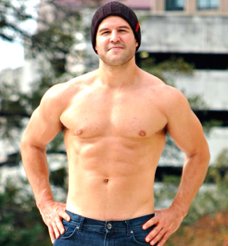 Chris Scott writes about addiction and fitness on his blog, Fit Recovery. After working in finance for five years, he became a personal trainer and enjoys helping people devise lifestyle strategies to align their mental and physical health.
Chris Scott writes about addiction and fitness on his blog, Fit Recovery. After working in finance for five years, he became a personal trainer and enjoys helping people devise lifestyle strategies to align their mental and physical health.
Life Is Beautiful & Meaningful After 7-Months Of Severe Depression | Maria’s Success Story

 The following is a guest story by Maria.
The following is a guest story by Maria.
When I first talked to Maria I instantly knew that she was going to recover quickly.
Making a firm decision to fix your depression is the first step to actually beating it.
Maria talks about her story, the resources she used, and how she finally found what looks like a long-term cure to her mood problems.
Everything is exactly how she sent her story to me, except for added links if you want to learn more about the resources and books she mentions.
Enter Maria
It is a lovely autumn day, Tuesday October 28th 2014, and I feel life is beautiful and meaningful, again! But, just two months ago, this was not the case. I was at the end of my rope trying to find a way to climb out a 7-month long severe depression episode that started back in January. So what happened you ask?
The turning point was Saturday August 16th when I found TJ. I was browsing the internet using the key words depression and positive thinking. This lead me an article written by TJ:
“The problem has nothing to do with positive thinking. The problem has to do with a misunderstanding of depression… When your head’s on fire, the book “Feeling Good” is only going to make you feel worse. This book was a great read–when I wasn’t depressed or anxious. The problem is that the book was useless when I was suffering from severe anxiety and depression… If you are in a deep depression one positive thought is not enough to change your brain chemistry. Not only that, but isn’t thinking positive hard while depressed? Isn’t that a symptom of depression?!”
This message resonates with me completely: when I am not depressed, I have no problem doing positive thinking. In fact, I am known as a half-glass-full type of person to family, friends and colleagues. I never believed that negative thinking caused my depression, but what else then?
So, I read everything on http://dominatedepression.com/ that day and left a phone message on the contact number provided, but I was not sure what to expect. When the phone rang the following night past my no-phone curfew time, I had a premonition and I picked up the phone. Indeed, it was TJ calling back and we talked for forty minutes!
Next, I started his 6-week program, read the Mood Cure book by Ross recommended by TJ and arranged a few one-on-one sessions with him. Well, I made a partial recovery after about 2 weeks (depression was gone but not the various side effects from the antidepressants I tried but had stopped back in early August; more on this alter) and a complete recovery after about 1 and half months. Maybe the depression had run its course, but let me just tell the story.
I found the Mood Cure book a great complementary tool to the 6-week program. The amino acid supplements approach did not have the proclaimed 1-day effect, but my depression went away after about 2-weeks of trying various supplements, as well as changing my diet as recommended.
The one-on-one sessions (3 one-hour and 1 half-hour) with TJ were extremely helpful to me for two main reasons. They convinced me to do some tests to pinpoint the problems more quickly, and they offered me much needed moral support during the recovery period. (I was extremely anxious to see the result as I felt that this approach was my last resort.)
During these sessions (via Skype), TJ never gave me the feeling that he was watching the clock (like most therapists do)! Besides his passion and commitment, I was also totally floored by his professionalism. Once I pre-paid for one-hour session but then decided to do half-hour only. Before I even had a chance to tell TJ to return the money, I already received a refund from PayPal!
Back to the recovery, the various tests showed that I am mostly healthy and balanced but my stress-hormone cortisol is out of the roof, and my vitamin D and Iron level are low. In retrospect, these are not surprising findings, positive or negative: 1) I have always eaten ‘healthy’ (lots of vegetables and fruits, limited sugar) hence the overall good test results. But my past diet did not contain enough fat and protein (I am a middle-aged woman who always has the last 10 lbs to loose 🙂 which are critical to mental health. 2) My depression episodes (started 5 years ago) tend to occur in the fall and winter seasons, and vitamin D and Iron are essential to a happy mind.
So, I am now taking vitamin D and Iron supplements and also use a light box. 3) I am one of those over-achievers and perfectionists, not in the clinical sense, who burn the candle at both ends: try to be successful at a stressful job and try to run a happy family of four. At times, I almost enjoyed being a ‘super’ woman, but then I crashed, lesson learned hard way! So these days I am more in tune with my body and rest whenever necessary. Stress management is one of the keys in my case.
A few remaining but important points to make: TJ was instrumental to my recovery, but long before I found him, I tried medication, exercise, talk-therapy and mindfulness.
Medication did not work for me! In fact, the first medication I tried (I have resisted taking medication until this most recent episode) made me severely insomniac. This coupled with atypical high stress turned my mild depression into a severe one. (My previous episodes in the past 5 years were never this severe and usually lasted about 4-5 months. I recovered from them by exercising and quit drinking.)
Then I needed other medications for insomnia. My sleep got better but my depression never went away and the medication also had various side effects on me. I understand that medication might be necessary for some people, and I did read various success stories online. But, it just did not work for me. TJ has his own interesting story with medication that is worth reading.
Exercise is key in prevention and recovery. In the past, exercise helped me recover and I noticed the pattern of slacking on exercise just before an episode hits. However, during this episode when I was severely insomniac and depressed, exercise did not have the usual effect on me, because my body was stressed to a breaking point.
Soon after I found TJ and started to take supplements and change my diet, exercise had its usual magic on me again. So I am exercising regularly now: 3-4 times a week with group aerobic exercises, weights or jogging. I also walk a lot.
Talk-therapy was helpful. I found a good therapist through a friend and I met with him weekly for about 3 months. (This was the first time I tried talk-therapy because of the severity of this episode.) Although I learned a few useful tips, I must say it provided more of a moral support than anything else. This is mostly due to the fact that I am generally a positive person, as said early, and I know the essence of cognitive behavior therapy (CBT).
I have no problem implementing it when I am not depressed but it is hard when I am depressed! This explains why I found TJ’s view on depression-and-positive-thinking so refreshing and resonating. Having said that, practicing CBT every day does not hurt and seeing a good therapist is even better if finance is not a concern.
Mindfulness study was interesting. I took a 8-week course while still depressed. I also bought The Mindful Way Through Depression book by Williams, Teasdale, Segal and Kabat-Zinn. It made me realize how not mindful I had been living my life: I am goal oriented and kind of always on the run. But ,it did not pull me out of depression. The book indeed cautions against practicing it if you are in the midst of deep depression. But I was desperate, to say the least. Nowadays, I try to be as mindful as I can. It is hard but I believe it is useful in prevention.
What else? Not surprisingly I spent much time on internet and read many self-help books during my recover. Internet browsing is a double-edged sword. Without it I wouldn’t have found TJ, but I also felt that some of the time spent there was not constructive. Self-help books are, no pun intended, helpful. I personally find the following two books particularly helpful: Peace is Every Step by Thich Nhat Hanh, who is the father of mindfulness practice, and Back from the Brink by Cowan, who really provided moral support through his story and his interviews with others who suffer from depression.
They say that the relapse rate is high among people who had recurrent episodes. But I hope I have found my long-term solution: stress management (rest, let-it-go, less worry and less perfectionisms, mindfulness and social activities), good diet, exercise, and some supplements when needed! I cannot thank TJ enough for helping me find this path.
TJ has asked me if I would do video testimonial, because “it seems like positive messages make it through the “depression filter” for people much better when they see a video”. Unfortunately I am not brave enough to do so: I am worried about the stigma associated with depression. Nevertheless I hope my story here can help you in some way.
Best wishes,
Maria
Afterward by TJ: Maria was definitely set on overcoming depression by utilizing all her resources. What resources are available to you that you can go out and start using today?
